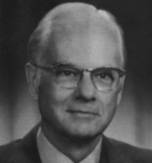
No story of WHA can be told without including Harold McCarty, who after Earle M. Terry is the most crucial figure in early Madison radio. Indeed McCarty is not only significant for his contributions to the development and flourishing of the School of the Air. He was a leading national proponent of non-commercial radio, served as president of the National Association of Educational Broadcasters (NAEB) during its most formative years, and published widely on the subject of educational radio.
McCarty came to Madison to do graduate work in advertising and marketing, but he soon tired of business and transferred to the Theater and Speech department in 1928. He had a background in acting and singing, and this led to his first job as an announcer for William Evjue‘s WIBA radio for 8 hours per week. In 1929 he joined WHA as a part-time broadcaster. Upon a serendipitous trip to Chicago he heard educational rebroadcasts from the Ohio School of the Air as well as some educational NBC programming on WMAQ.
Shortly after, he returned to Madison ‘fired up’ to begin a full-time School of the Air at WHA. The original idea was to broadcast to 4000 one room schools across Wisconsin, but as development continued an entire radio curriculum was born. After he became program director in 1931, he joined the department of Speech as an instructor of radio education, in 1931 working with Speech professor Henry L. Ewbank on the development of educational radio broadcasting techniques. Hereafter McCarty was in charge of the everyday operations of WHA, including programming and personnel. On top of his administrative duties, McCarty played famous WHA radio characters Sergeant Safety and Captain Jack on the air.
Besides his work at WHA, McCarty was president of the National Association of Educational Broadcasters during the mid 1930s. The NAEB was a group comprised of dozens of university station officials interested in exchanges of information related to ‘best practices’ and radio education. While the NAEB had been around since the 1920s, it really didn’t organize or heavily invest in the political promotion of educational radio until McCarty’s election to leadership. Thus the School of the Air under McCarty was beneficially influenced through 1) His access to and correspondence with other national experiments in radio curriculum, 2) The foundation laid by previous program director, William Lighty, and 3) The strong core of educators and announcers that worked at WHA in the 1930s.
But McCarty—finding himself at the center of both national debates and everyday practices—also became a resource for fellow educational networks and a national leader on the subject. Interest in the philosophical underpinnings of educational radio coupled with a desire to streamline broadcast practices led McCarty, along with colleague Harold Engel, to study the British Broadcasting Corporation‘s model for public service radio in the mid to late 1930s, and again in a more detailed study in the mid 1940s.
Of radio’s potential McCarty wrote: ‘Radio ends classroom isolation. It pushes back school walls and opens the view to the whole wide world. It puts school life in touch and step with life outside. Radio brings inspiring personalities and master teachers to the aid of the classroom teacher. It stirs the imagination and motivates children to their finest effort. Radio speeds up the introduction of new ideas, concepts, and materials. It leaps the time gap which exists when you must wait for print’ (“Canada, Germany, Wisconsin: Schools of the Air Director Tells a Short Short Story with a Moral.” Prepared for Live Radio Address. Harold McCarty Collection, Box 49). The purpose of non-profit radio, McCarty contended, was to be a free and open ‘communication device’ that carries ‘the persuasiveness of the human voice instantly to millions of people in their homes shops, barns, clubs, and automobiles’ (Untitled Document, probably written for a conference, class, or live address. Box 49). Such a device should be used, he posited, not to serve all people all of the time, as commercial networks intended, but to provide various interest groups with programs not available to them otherwise, and to better the consciousness of a station’s listening constituency through quality educational programming.
Harold McCarty served WHA for 36 years, first as station manager, then as director of the Wisconsin State Broadcasting System, continuing on as Executive Director of the Wisconsin Radio and Television Council until his retirement in 1966. He was one of the major forces behind the development of Wisconsin’s statewide FM radio network and one of the true leaders of the development of educational broadcasting in the United States.
McCarty donated the entirety of his records to the Wisconsin Historical Society, which range from his earliest practices at WHA to later personal documents up to 1986. The archives—spanning thousands of pages of correspondence, business records, program notes, and broadcast content—are currently unprocessed, with only a general register available. However, his personal papers are a significant resource and insight into early Madison, and indeed national radio history.
Digital Documents
Wisconsin School of the air Press release
Related Links
